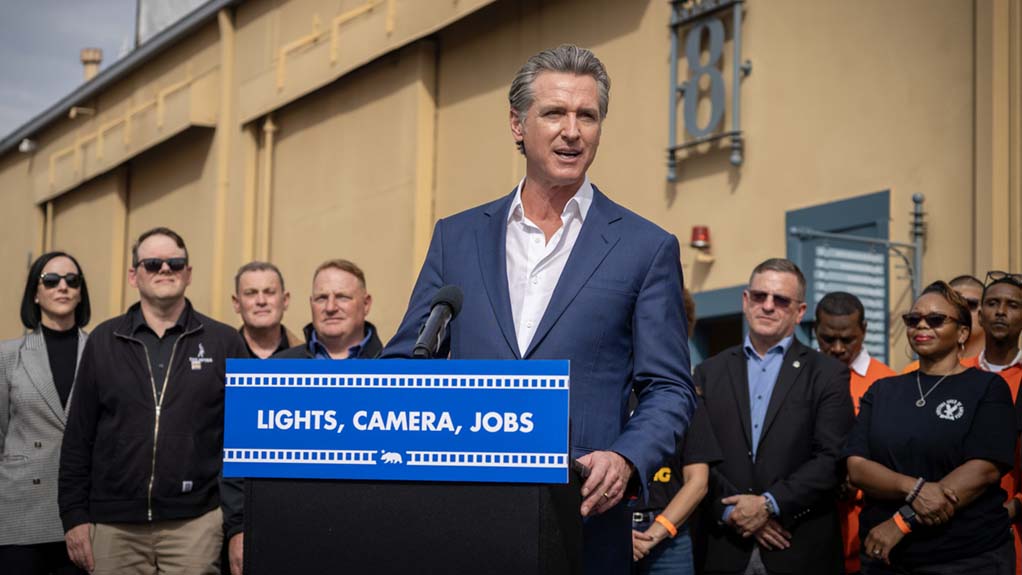
In an effort to maintain its status as the “entertainment capital of the world,” California Gov. Gavin Newsom has proposed a more than doubling of the state’s Film & Television Tax Credit Program from the current $330 million allocation to $750 million annually.
“This ambitious expansion would position California as the top state for capped film incentive programs, surpassing other states like New York,” Newsom said in announcing the expansion. “California is the entertainment capital of the world, rooted in decades of creativity, innovation and unparalleled talent. Expanding this program will help keep production here at home, generate thousands of good-paying jobs and strengthen the vital link between our communities and the state’s iconic film and TV industry.”
In recent years, the state has seen a decrease in tax revenues from film and TV production, partly due to the double whammy of the pandemic and the almost year-long actors and writers strike that crippled the industry in 2023. But the governor’s office attributed the main reason for the decline to the limits of the current program.
“This program has been oversubscribed year after year, with more productions applying than can be accommodated under the current cap,” Newsom said. “Between 2020 and 2024, data shows California lost production spending due to limited tax-credit funding and increased competition in other states and countries, directly impacting state jobs and local economies.
“In recent years, projects that were unable to secure California’s tax credits and moved to other locations as a result contributed to significant economic losses, with an estimated 71% of rejected projects subsequently filming out-of-state,” the governor added.
This past summer, overall production in greater Los Angeles declined by 5% to 5,048 shoot days, according to the latest report from FilmLA, the film office for the city and county of Los Angeles. “The lackluster quarter was the weakest so far in 2024, and surprising for its failure to meet or exceed numbers shared at this time a year ago,” [during the strike],” FilmLA said.
FilmLA President Paul Audley voiced his advocacy for the program earlier this month and urged it to be updated.
The professional video industry's #1 source for news, trends and product and tech information. Sign up below.
“California’s film incentive is a proven jobs creator that studies show provides a net positive return on every allocated dollar,” he said. “What the program lacks is funding and eligibility criteria that reflect the outputs of the industry in 2024. The program’s structure and management through the California Film Commission—these are excellent. But just as our competitors continue to innovate, California must do the same.”
According to a study of California’s film incentive, for every dollar of tax credits approved, the program generated at least $24.40 in output, $16.14 in GDP, $8.60 in wages and $1.07 in initial state and local tax revenue from production. Since its inception in 2009, California’s Film & Television Tax Credit Program has generated more than $26 billion in economic activity and supported more than 197,000 cast and crew jobs across the state, according to the governor’s office.
Tax credits will become refundable for the first time since the program’s inception in 2009, beginning with Program 4.0 set to commence on July 1, 2025.
Los Angeles Mayor Karen Bass added her support. “Hollywood is the cornerstone of this city and our economy and our message to the industry today is clear—we have your back,” she said. “When I was Speaker of the California State Assembly, I worked to support leaders like now-Councilman Paul Krekorian to create the film tax credit. Despite the economy being in a difficult spot, we knew that the industry needed support and if we could at least start the program, then we could grow it. Today I’m proud to stand with Governor Newsom and industry leaders to continue this important work supporting this legacy industry.”
Tom has covered the broadcast technology market for the past 25 years, including three years handling member communications for the National Association of Broadcasters followed by a year as editor of Video Technology News and DTV Business executive newsletters for Phillips Publishing. In 1999 he launched digitalbroadcasting.com for internet B2B portal Verticalnet. He is also a charter member of the CTA's Academy of Digital TV Pioneers. Since 2001, he has been editor-in-chief of TV Tech (www.tvtech.com), the leading source of news and information on broadcast and related media technology and is a frequent contributor and moderator to the brand’s Tech Leadership events.

